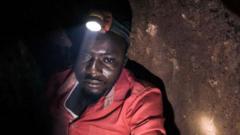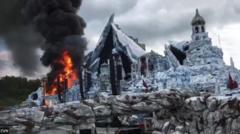The Democratic Republic of Congo has initiated criminal proceedings in France and Belgium aimed at Apple, asserting that the company is complicit in the exploitation of conflict minerals sourced from the war-torn eastern regions of the country.
DR Congo Takes Legal Action Against Apple Over Conflict Minerals

DR Congo Takes Legal Action Against Apple Over Conflict Minerals
The Congolese government accuses the tech giant of complicity in human rights abuses in mineral-rich regions.
The Democratic Republic of Congo (DRC) has lodged criminal complaints in France and Belgium against Apple, accusing the technology giant of utilizing conflict minerals. Acting on behalf of the Congolese government, lawyers allege that Apple is intertwined with armed groups that control mineral mines in the eastern region of the DRC.
In its recent review, Apple claimed to monitor its supply chains closely and proactively address risks while improving efforts to trace mineral sources. Consequently, authorities in France and Belgium are now deliberating whether sufficient evidence exists to advance the legal case.
The DRC’s legal representatives have referred to Apple’s supply chain as tainted by "blood minerals," alleging that tin, tantalum, and tungsten sourced from conflict-prone areas are filtered through international supply networks. They argue this practice has perpetuated violence and funded militias, alongside contributing to forced child labor and severe environmental damage.
Although Apple has not provided commentary on the allegations, its 2023 US Securities and Exchange Commission report emphasizes the measures it undertakes to ensure avoidance of conflict minerals. The firm insists it does not directly purchase or source primary minerals and aims to exceed recognized diligence standards regarding these materials.
As part of its commitment, Apple requires all supply chain stakeholders to undergo independent audits concerning conflict minerals. The tech company revealed that it ceased sourcing from 14 smelters and refiners that failed to comply with responsible sourcing standards in 2023.
The eastern DRC, abundant in valuable minerals, has historically faced violent conflicts, exacerbated by the global demand for such resources. Advocacy groups have consistently claimed that a significant amount of minerals—sourced from legitimate operations and those controlled by armed factions—is routed through neighboring Rwanda and ends up in consumer technology products worldwide. Rwanda has characterized the DRC's legal actions against Apple as a publicity endeavor, vehemently denying any involvement in selling conflict minerals to the tech company.
In its recent review, Apple claimed to monitor its supply chains closely and proactively address risks while improving efforts to trace mineral sources. Consequently, authorities in France and Belgium are now deliberating whether sufficient evidence exists to advance the legal case.
The DRC’s legal representatives have referred to Apple’s supply chain as tainted by "blood minerals," alleging that tin, tantalum, and tungsten sourced from conflict-prone areas are filtered through international supply networks. They argue this practice has perpetuated violence and funded militias, alongside contributing to forced child labor and severe environmental damage.
Although Apple has not provided commentary on the allegations, its 2023 US Securities and Exchange Commission report emphasizes the measures it undertakes to ensure avoidance of conflict minerals. The firm insists it does not directly purchase or source primary minerals and aims to exceed recognized diligence standards regarding these materials.
As part of its commitment, Apple requires all supply chain stakeholders to undergo independent audits concerning conflict minerals. The tech company revealed that it ceased sourcing from 14 smelters and refiners that failed to comply with responsible sourcing standards in 2023.
The eastern DRC, abundant in valuable minerals, has historically faced violent conflicts, exacerbated by the global demand for such resources. Advocacy groups have consistently claimed that a significant amount of minerals—sourced from legitimate operations and those controlled by armed factions—is routed through neighboring Rwanda and ends up in consumer technology products worldwide. Rwanda has characterized the DRC's legal actions against Apple as a publicity endeavor, vehemently denying any involvement in selling conflict minerals to the tech company.



















